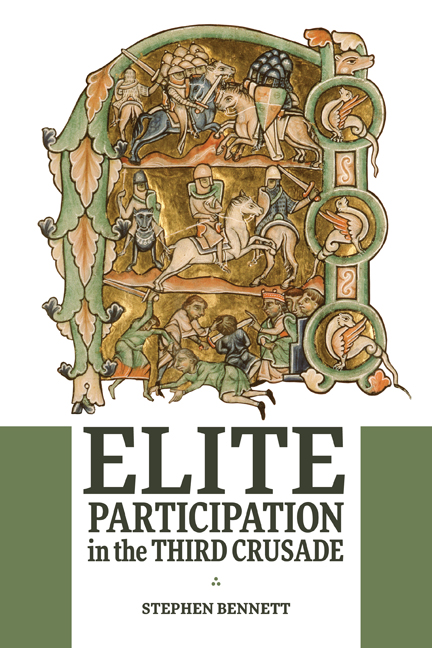Book contents
- Frontmatter
- Contents
- List of Illustrations
- Preface and Acknowledgements
- List of Abbreviations
- Notes on Sources, Names, and Coinage
- Map
- Introduction
- 1 Faith and Finance: Religious Foundations, Ecclesiastical Leaders, and Fraternity
- 2 Family and Heritage: Lineage, Kinship, and Tradition
- 3 Locality and Fellowship: Territory, Trade, and Tournaments
- 4 The Household of King Richard I at the Time of the Third Crusade
- Conclusion: Personal, Spiritual, and Communal Influences on Participation in the Third Crusade
- Appendices
- Bibliography
- Index
- Warfare in History
2 - Family and Heritage: Lineage, Kinship, and Tradition
Published online by Cambridge University Press: 09 February 2021
- Frontmatter
- Contents
- List of Illustrations
- Preface and Acknowledgements
- List of Abbreviations
- Notes on Sources, Names, and Coinage
- Map
- Introduction
- 1 Faith and Finance: Religious Foundations, Ecclesiastical Leaders, and Fraternity
- 2 Family and Heritage: Lineage, Kinship, and Tradition
- 3 Locality and Fellowship: Territory, Trade, and Tournaments
- 4 The Household of King Richard I at the Time of the Third Crusade
- Conclusion: Personal, Spiritual, and Communal Influences on Participation in the Third Crusade
- Appendices
- Bibliography
- Index
- Warfare in History
Summary
Consider therefore, my sons, how you came into this world and how all leave it, how all things pass and thus you will pass on. Use the time for repentance and doing well insofar as it regards you, with thanks. Give yourselves over not to utter destruction, but give for yourselves in service to him, from whom you and everything came because you who cannot make even a gnat upon the land, have nothing of your own.
Pope Gregory VIII, Audita Tremendi, 1187Traditions of familial commitment to the crusading movement were established very quickly. By the time of the Third Crusade some families could draw upon nearly a hundred years of dynastic practice and this chapter shows that significant numbers of participants enjoyed a crusading pedigree. Similarly, from the First Crusade onwards, crusaders often departed for the Holy Land alongside their kith (friends) and kin (family) or as members of military households as part of a collective response. This chapter shows that the Third Crusade was no exception.
In many elite families, crusading took place both across and within generations, and individuals might take the Cross on a number of separate occasions alongside differing members of their family. Based on his comprehensive prosopographical research of the early crusaders, Jonathan Riley-Smith argued that ‘the crusading movement itself was as much in the collective consciousness of certain noble and knightly families as in the action and the thinking of theoreticians’. Christopher Tyerman came to a similar conclusion in his review of English crusaders, referring to collective consciousness as a ‘habit of mind and action to be passed down to succeeding generations’. Current thinking on the Third Crusade is focused predominantly on participants as either part of the contingents of Frederick Barbarossa, the kings of France and England, and the count of Flanders, or listing crusaders from a particular region, such as Normandy. Analysis of the influence of crusading pedigree on participation in the Third Crusade, as well as the degree to which they fought within kinship groups, has yet to have been undertaken.
- Type
- Chapter
- Information
- Elite Participation in the Third Crusade , pp. 90 - 120Publisher: Boydell & BrewerPrint publication year: 2021

